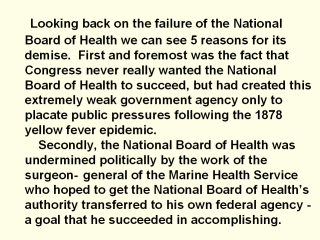| front |1 |2 |3 |4 |5 |6 |7 |8 |9 |10 |11 |12 |13 |14 |15 |16 |17 |18 |19 |20 |21 |22 |23 |24 |25 |26 |27 |28 |29 |30 |31 |32 |33 |34 |35 |36 |37 |38 |39 |40 |41 |42 |43 |44 |45 |46 |47 |review |
 |
Thirdly, the
National Board of Health was unable to overcome the stubborn opposition of
Dr. Joseph Jones and the Louisiana State Board of Health, which provided
Congress with ample ammunition to destroy the National Board of Health at
the 1883 Senate hearings considering the continuation of this agency. Fourthly the National Board of Health proved unable to maintain good relations, both with the Congress and the general public, who were very disappointed in the Board's inability to be more effective in curtailing epidemics in the South. Finally, the underlying concept of the National Board of Health was out-of?step with the political and economic philosophy of 19th century American life. The United States at that time was still a nation unwilling to look to the federal government to handle the basic problems of day-to-day life, as we do today, to a minor degree. For all these reasons Congress, in 1883, transferred most of the National Board of Health’s authority in the to the Marine Health Service. The National Board of Health remained on the statute books until 1893, but it ceased all serious activities as of 1883, a failed experiment in direct federal intervention in public health activities. |